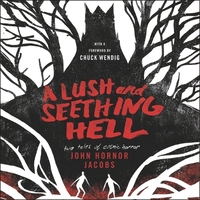Take a photo of a barcode or cover
challenging
dark
mysterious
sad
tense
slow-paced
Loveable characters:
No
dark
mysterious
reflective
fast-paced
Plot or Character Driven:
Character
Strong character development:
Complicated
Loveable characters:
Yes
Diverse cast of characters:
N/A
Flaws of characters a main focus:
Yes
Review will be appearing in the October 2019 issue of Library Journal: https://www.libraryjournal.com/?detailStory=horror-novellas-readers-shelf
dark
mysterious
tense
slow-paced
Plot or Character Driven:
A mix
Strong character development:
Complicated
Loveable characters:
Complicated
Diverse cast of characters:
Yes
Flaws of characters a main focus:
Yes
Det intressantaste jag läst i skräckgenren sedan jag sprang på Thomas Ligotti. Två noveller varav den första, The Sea Dreams It Is the Sky, bär klara drag från Lovecraft men är intressantare än så. Svårfångat, strukturlöst och vackert, samtidigt och fasansfullt. Den andra novellen, My Heart Struck Sorrow, är mer traditionell och kan bäst beskrivas som en blandning av Southern Gothic-kontex, typ Faulkners Light in August, kryddad med Lovecrafts besatta huvudrollskaraktärer vars sökande bara leder dem in i vansinnet. Mycket bra! Jag vill läsa mer av John Hornor Jacobs!
slow-paced
Plot or Character Driven:
Plot
Strong character development:
No
Loveable characters:
No
Diverse cast of characters:
Complicated
Flaws of characters a main focus:
Yes
First story has its merits (the badass lesbian was fun to read about), but by the second one I was a bit tired of the detailed descriptions of everyone's penises. The horror was a big miss for me as well. Not exactly "cosmic", either. Unless strange women that make you want to have sex with them in confusing ways is... horrific to you.
All of this felt too much male gaze-y for me, not to mention boring as hell.
All of this felt too much male gaze-y for me, not to mention boring as hell.
Graphic: Sexual content, Torture
Moderate: Drug use, Murder, Alcohol, Injury/Injury detail
This is a review of the second story, "My Heart Struck Sorrow".
The whole story has this underlying theme of "white academic liberals trying to understand poverty, the South, and the AfAm experience". It's actually pretty OK at this, though it was hard to pick up that this was part of what was going on until a specific journal entry from the 1930's writer, Harlan Parker, where he shares his opinions on Faulkner, claiming that Faulkner glorified the post-Civil War white man above all; it's such a wrong ass opinion on Faulkner that I actually went and looked up a bit on the author to see if he could possbily hold that opinion, and clearly he can't (he talks about loving Faulkner, and him being an inspiration, so like, yeah). I could talk about how wrong that opinion is, but its a funny detail for a character in the 1930s to have, when Faulkner was still publishing, and shows a certain amount of paternalism on the part of the Yankee academic. He gets it all, of course, and knows best. So in showing him having a clearly basic gloss of Faulkner, Jacobs is showing the flaws inherent in this type of person, who seems to be making a career exploiting the types of subjects he looks down upon.
I think there is only one part that maybe overplays this, and it is when Harriet/Hattie, an AfAm academic who works with Cromwell, the modern day main character who is reading Parker's journals and listeing to his filed recordings, scolds Cromwell for the clearly exploitative nature of their work, finding other people's music and recordings and making a career out of them. I say that it overplays it because it seems to really be coming out and just saying "oh shit here is a big theme" but I also understand the need to do that sometimes as an author. With this book being pitched as cosmic horror (which it didn't really work as for me, but that is OK), I could understand the fear of any audience overlooking it, so spell it out.
The next part is going to be more actual plot discussion, so jspoiler tagging that there:
Maybe this is why the story didn't work as cosmic horror for me. There are some definite horror scenes, but overall, the story is focused more on the personal, specifically the white male academic personal, to allow the cosmic to be the central focus. This might seem like a complaint, but it really isn't. The core story works because of the personal, and what cosmic horror is present is mostly window dressing for that. There's a lot more going on here, though, which yeah, gonna think about more.
The whole story has this underlying theme of "white academic liberals trying to understand poverty, the South, and the AfAm experience". It's actually pretty OK at this, though it was hard to pick up that this was part of what was going on until a specific journal entry from the 1930's writer, Harlan Parker, where he shares his opinions on Faulkner, claiming that Faulkner glorified the post-Civil War white man above all; it's such a wrong ass opinion on Faulkner that I actually went and looked up a bit on the author to see if he could possbily hold that opinion, and clearly he can't (he talks about loving Faulkner, and him being an inspiration, so like, yeah). I could talk about how wrong that opinion is, but its a funny detail for a character in the 1930s to have, when Faulkner was still publishing, and shows a certain amount of paternalism on the part of the Yankee academic. He gets it all, of course, and knows best. So in showing him having a clearly basic gloss of Faulkner, Jacobs is showing the flaws inherent in this type of person, who seems to be making a career exploiting the types of subjects he looks down upon.
I think there is only one part that maybe overplays this, and it is when Harriet/Hattie, an AfAm academic who works with Cromwell, the modern day main character who is reading Parker's journals and listeing to his filed recordings, scolds Cromwell for the clearly exploitative nature of their work, finding other people's music and recordings and making a career out of them. I say that it overplays it because it seems to really be coming out and just saying "oh shit here is a big theme" but I also understand the need to do that sometimes as an author. With this book being pitched as cosmic horror (which it didn't really work as for me, but that is OK), I could understand the fear of any audience overlooking it, so spell it out.
The next part is going to be more actual plot discussion, so jspoiler tagging that there:
Spoiler
The main body of the story is chronicling how Parker dives into this work, and it slowly destroys his life. The more he drives his way into the poorer and more miority communities of Arkansas, the worse his life seems to get. His attempts at exploitation seem to drive him to worse and worse stations in life, going the way cosmic horror characters end up going when they stare too hard into the void. But it turns out that what is driving him, what leads him to sutdy this one specific song so hard, is such a deep underlying guilt for what he has done (not gonna spoil that, but it's pretty obvious when it comes up). Cromwell then takes this as a hint as to what he should do about his own personal guil except he feels that guilt over something he doesn't know if he did on purpose, making it like a guilt-ulacrum or something, guilt felt for an action maybe not even committed. To be clear, he has some shit he should feel guilt over (some real Updike/Roth hours here) but that is not what he feels guilt over. This makes the ending of the story really work, in that it doesn't let him escape the way Parker sorta gets to. Cromwell is looking for an easy way out the whole time, and it doesn't exist; what easy way there was for Parker is not easy at all, and only lets him out with a dose of cosmic horror mind loss.Maybe this is why the story didn't work as cosmic horror for me. There are some definite horror scenes, but overall, the story is focused more on the personal, specifically the white male academic personal, to allow the cosmic to be the central focus. This might seem like a complaint, but it really isn't. The core story works because of the personal, and what cosmic horror is present is mostly window dressing for that. There's a lot more going on here, though, which yeah, gonna think about more.
dark
mysterious
tense
slow-paced
Plot or Character Driven:
Plot
Diverse cast of characters:
Yes
Flaws of characters a main focus:
Yes






